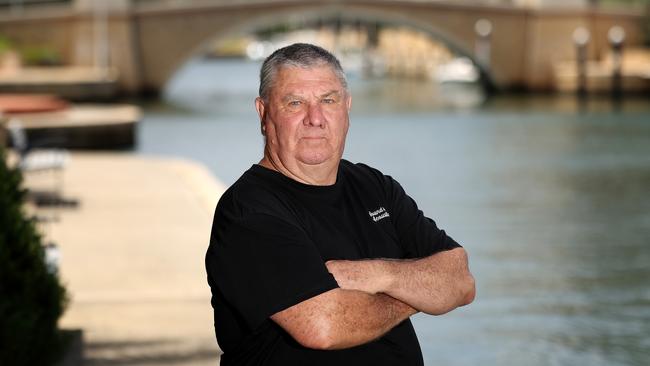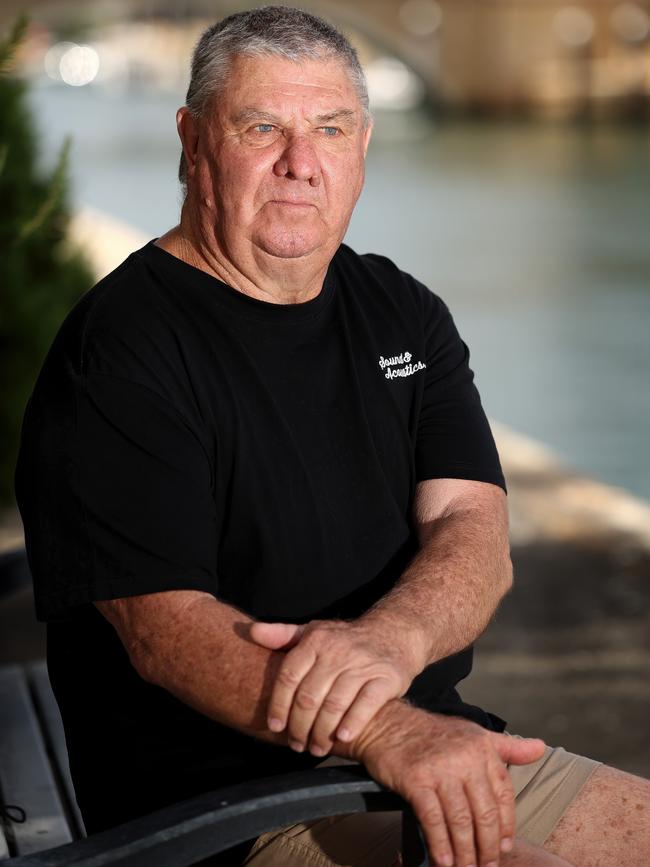Kalkine former customers claim high pressure sales and poor advice has led to massive losses
Transcripts of outbound calls reveal how Sydney financial services group is pressuring vulnerable clients into spending thousands on investment advice.

A Sydney financial services group purporting to be a global research firm is using international call centres to pressure vulnerable clients into making expensive investment decisions.
Kalkine, which operates out of offices just doors down from the Australian Securities Exchange in Sydney, launched in 2014 and has a financial services licence that allows it to provide general advice.
But transcripts of outbound calls from the company’s call centres, obtained by The Australian, show customers – including one who was 90 years old at the time – being told to sell specific stocks and instead take out expensive subscriptions to the company’s equity advice newsletters.
In the call with the 90-year-old, a man who identifies himself only as Gabriel and describes himself as “senior head with Kalkine”, pushes the customer to sign a two-year contract to receive a newsletter on health stocks.
The customer responds that the product is not suitable as he may be dead in two years.
“What is your plan? What do you need to do on them?” Gabriel asks him.
“You should do some trading. Because (the) market is amazing right now. It’s trading at very low. Investing anything can add a lot of value to our portfolio because we need to sell out (a) few things from this portfolio.”
In the call, Gabriel instructs him to sell several key stocks – specifically his holdings in Amcor, CSR, Suncorp and Whitehaven Coal – as there is “a lot of potential” in the market.
“I want you to have some good dividend-paying companies in this portfolio and that will be from the health sector, which I will give you,” Gabriel tells the customer.
Several former Kalkine customers who spoke to The Australian said the company had advised them to sell blue-chip investments and buy small-cap stocks that had performed poorly.
In a second call obtained by The Australian, Gabriel – who now describes himself as Kalkine’s senior account manager and head of research – attempts to persuade a man in a 40-minute call to sign on to a $5500 newsletter service.
“Don’t think about it, trust me and we’ll make a lot of money,” he says.

Gabriel tells the man – who claims to have lost $6000 on Kalkine’s advice – that he will “go recover all that with all my best of the general advice” if he pays $8000.
“I’m not trying to go and put you on board just to get you the money … I’m here to go ahead and make you profit, this is what we try to do,” he said.
“Let’s not just keep talking, let’s do some investment and make some profit.”
In another call, Gabriel tells a second client to sell Telstra and Redbubble shares to free up some $41,000 to invest in soon-to-be-disclosed health stocks.
“I’ll give you two stock which you need to buy tomorrow morning. First thing in the morning,” he says.
Kalkine describes itself as a business that uses “digitally powered architecture and extensive data science-led research” to provide insights on equities.
It says its hypothetical growth portfolio has recorded returns of 12.8 per cent over the benchmark – the S&P/ASX Small Ordinaries – in the 12 months to June 30, 2021.
The company has offices in Australia, New Zealand, India, the UK, US and in Canada, it says.
New Zealand’s corporate regulator in August found “concerning” behaviour by Kalkine’s staff, demanding it stop calling in the country until it was notified that the Financial Markets Authority (FMA) was “satisfied that Kalkine’s compliance processes are sufficient for outgoing sales calls to resume”.
The FMA began its investigation into Kalkine, which also holds a licence to operate in New Zealand, after a number of complaints from former customers.
It noted Kalkine was “likely to mislead prospective clients generally in relation to Kalkine’s advice service” and was “likely to mislead clients in relation to Kalkine’s primary place of operations”.
In August, FMA director of supervision James Greig said it found Kalkine was providing investment advice “with little or no regard to the inherent high risk and estimating clients could make monthly returns of 10-20 per cent as a result of purchasing Kalkine’s research reports”.
“It is unacceptable for a financial advice provider to make misleading statements when marketing its service,” he said.
“Of particular concern, Kalkine’s representations could entice people who may not be aware of the risks of investing into purchasing an advice subscription, and potentially financial products that are not appropriate for them.
“This can lead to significant financial loss, cause distress and undermines confidence in New Zealand’s financial advice sector.”
In Australia, Kalkine has also been the target of action from the Australian Communications and Media Authority, which in 2021 fined the company $352,000 after it contacted some 5400 people on the Do Not Call Register between January and September 2020.
Kalkine was also found to have sent 2774 spam emails to 2700 people without their consent during the period.
Kalkine was forced to sign a court-enforceable, two-year undertaking to review systems and processes, but many people spoken to by The Australian report Kalkine continues to attempt to contact them despite repeatedly telling the company’s representatives to stop.
“The phone will never stop ringing when they’re trying to negotiate the deal,” said one former Kalkine client, who spoke on condition of anonymity. “The calls will go late at night. They’ll sit by the phone and wait for you to do a BPAY to get the money deposited in their account.”
Some former Kalkine subscribers report the firm would constantly push them to sign up to further subscriber services.
“Eventually you own the platinum bundle, but now they’ve come out with a new bundle,” one former subscriber said.
“I’ve had 90-minute phone calls trying to sell me the next service.”
Kalkine customers who spoke to The Australian said they had complained to the Australian Financial Complaints Authority.
Some had been offered compensation, although the proposed repayments often fell far short of the sums spent by subscribers on the multitude of newsletters.
In a statement, Kalkine said it always operated within its Australian Financial Services Licence and guidelines “to help our customers consider how they can use our general information services in their decision making”.
Kalkine did not provide individual or specific advice and the firm’s sales practices were “in line with its AFSL obligations and other relevant and applicable laws”, it said.
“Each sales agent is given regular Kalkine product trainings and are equipped with appropriate call scripts and guidelines to make sure that they abide by AFSL obligations while dealing with any customer or potential customer.”
Kalkine’s call scripts “clearly state that the calls are being made on behalf of Kalkine Pty Ltd by Kalkine Solutions Private Limited”, the company said.
However, in many of the calls heard by The Australian, the firm’s representatives say they are calling “from Kalkine”.
“When we find a customer’s experience that is not within our policy standards, which is rare but we must admit can happen, we aim to act promptly,” Kalkine said in its statement. “If this arises we aim to agree to an outcome with the customer.”
Toby Fricker, a retired Alcoa worker in Perth, told The Australian he had paid thousands for Kalkine’s newsletter, but he said he stopped dealing with the company more than 18 months ago.

“I’d have to add up what I’ve given them over the years. I reckon it’s close to $30,000,” he said.
Mr Fricker said Kalkine’s staff directed him to make several poor investments that lost value.
He said Kalkine staff went through his portfolio, giving him explicit instructions on how much of his shareholding to sell.
“They said buy this crap,” he said.
“I seemed to do better on my own.”
Mr Fricker said Kalkine’s staff subjected him to repeated calls in a bid to get him to hand over more money.
“I said no, no I can’t afford that, I'm retiring, and they just said ‘how much super have you got?’,” Mr Fricker said.
“I still get phone calls from them – I block them, but they keep coming back.”
Mark Tait is another former Kalkine customer. He told The Australian the company had told him when he first signed up that it would only supply general advice.
He claims it quickly became clear he was being given explicit buy and sell instructions.
“I was told by this guy that he’d be my personal adviser and if I signed up he’d look after me, the approach was that any money we put in, that we’d have it back in a couple of months,” Mr Tait said.
He did not invest much as he was wary of the recommendations, he added.
“I’ve had the girl from their office ring me 40 minutes ago and I told her that I wanted my money back.”
Financial Planning Association chief executive Sarah Abood said companies should not provide personal financial advice if they were not licensed to do so.
“People giving that advice need to be appropriately licensed. If you’re going to be giving personal financial advice in this country you need to comply with this country’s laws,” she said.
“There is an exemption that many companies are relying on around the media that if you’re in a media position you can publish information about stocks and still can’t give people personal financial advice,” she said.
“But the suggestions that I made or information given can be seen to be personal financial advice.”
Separately, in late December, the Federal Court found social media influencer Tyson Scholz’s investment advice business breached laws banning him from providing unlicensed financial advice.
Federal Court judge Kylie Downes found that although Mr Scholz did not make “overt recommendation to acquire the shares, it was enough that Mr Scholz referred to a company or its shares in the stories, which was usually done in a way which indicated that he liked that company”.
Ms Abood said those spruiking financial services must consider whether they are complying with anti-hawking laws introduced in October 2021.
“If someone is found in serious breach of these laws at the very least substantial fines can be levied,” she said.
The Australian Securities and Investments Commission announced prohibition on hawking unsolicited financial products via cold calling or unsolicited contact, with fines ranging up to $165,000 for non-compliance.
Firms are banned from offering a financial product to retail clients in an unsolicited manner and consumers must consent to being contacted.
An ASIC spokesman said any organisation with an AFSL must comply with its obligations.
“Any licensee that provides financial product advice to retail clients must prepare and provide a Financial Services Guide and give a general advice warning when giving general advice,” he said.



